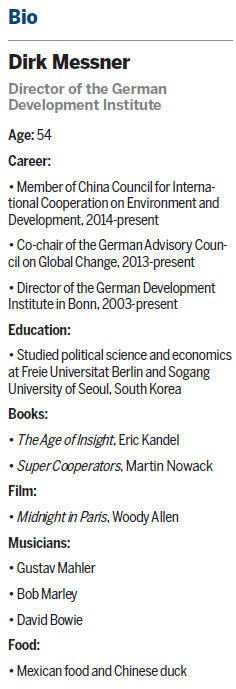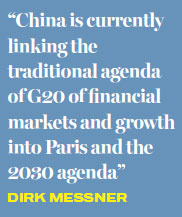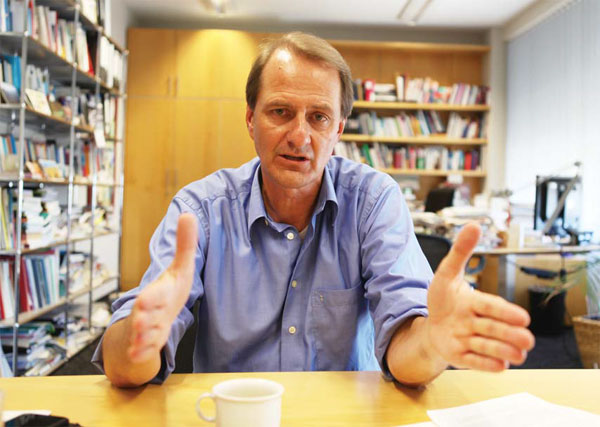China sets an example for Germany

Such issues as sustainability and global governance have been elevated at the G20, presenting a path to next presidency
China's new contribution in helping improve global sustainable infrastructure, green financing and international development during its G20 presidency is impressive and should be followed by Germany when it takes the reins next year, according to a prominent German think tank expert.
China has brought new dimensions to the G20 Leaders Summit platform, German Development Institute Director Dirk Messner says as the G20 leaders prepared for their 11th gathering, on Sept 4 and 5 in Hangzhou, capital of Zhejiang province.
| Dirk Messner says China has brought new dimensions to the G20 Leaders Summit. Fu Jing / China Daily |
The platform traditionally has focused on global growth and economic governance reform since the first meeting was held in Washington at the height of the financial crisis in late 2008.
"Looking at the Chinese presidency agenda, there are several things that are very important from Germany's perspective, and we think tanks could use them as bridges to make connections," says Messner, who started advising the Chinese government about 10 years ago on sustainable development. He was speaking during an interview in his office in Bonn recently.

Messner praised China's leadership in the current G20 presidency and says he thinks China and Germany could use the 2016-17 presidency to help speed up changes needed to restructure the global economy to be more sustainable.
Messner says the first thing needed is sustainable infrastructure. The global economy is still in trouble, and to improve growth, nearly all countries are focusing on infrastructure investment, which is crucial.
The next 20 years are expected to see the world's biggest infrastructure investments, and most will be in urban areas.
It's important, he says, to place investment trends in the context of climate agreements and the 2030 global sustainability development goals of the United Nations. Making infrastructure green and sustainable will engage the dynamics of the global economy.
In this area, Messner says China is leading the way because it will invest a lot at home, but also along points to the Belt and Road Initiative routes, while European countries and the United States are renewing their urban and energy infrastructures.
He says building infrastructure projects at new, sustainable and carbon-free developments is important and China has already done a lot in recent years.
Messner, who also serves as an expert for the China Council for International Cooperation on Environment and Development, an international advisory body to the Chinese government, says the council produced a policy report on these issues for Beijing in November in preparation for China's G20 presidency.
Green financing should top the G20 summit agenda, he says, adding that China combines green dimensions with financial market reform, helping to reduce speculation, improving transparency and stabilizing the market.
Messner says that in 2015, the United Nations reached two important agreements, namely the Paris climate change deal and its sustainable development goals, amid tremendous new challenges.
"We have reached the two agreements and the question is how we transmit their implications to the future," he says. "This would be historic."
Messner says China has had the first G20 presidency since the Paris climate summit, under the United Nations Framework Convention on Climate Change, which dealt with greenhouse gas emissions, mitigation, adaptation and finance. The agreement was negotiated in Paris in December. At its heart is holding the increase in the global average temperature to well below 2 C above pre-industrial levels.
The sustainable development goals were created when the UN adopted a plan for the next 15 years to end extreme poverty, fight inequality and injustice, and protect the planet. The goals are at the heart of the UN's Agenda 2030 development vision.
"My understanding is that China is currently linking the traditional agenda of G20 of financial markets and growth into Paris and the 2030 agenda," he says. "This is the third thing which I think could be very important at the upcoming G20 summit and Germany could follow up."
In terms of transforming development patterns, Messner says China is at a crossroads. Many new sustainable models, such as decarbonization and energy efficiency, are occurring, and he says there is a huge shift in thinking in China, especially in recent years.
He recalls that a task force of the China advisory council proposed a low-carbon economy concept to China's leadership before the 2009 Copenhagen climate change summit, but top leaders responded that such a pattern was more important for Europeans because China's development was based on an energy system heavily dependent on coal.
"This was what happened only eight years ago, but now China has become the world's biggest low-carbon investor. That is a huge shift in thinking," he says. "Because, for China's leadership, they believe if they don't link growth and sustainability, that would be a disaster nationally, with (high) costs."

Still, these developments are new and the world is looking for solutions. "So China and Germany should be the two pioneering countries to push such an agenda at G20 summits," he says.
China has global proposals in the pipeline, he says, adding that the Belt and Road Initiative should be a model for a new type of global cooperation linking growth and sustainability.
Another plan, the European Commission's Investment Plan for Europe, known as the Juncker plan, is a 315 billion euro ($350 billion) infrastructure investment program first announced by European Commission President Jean-Claude Juncker in November 2014.
Messner says neither plan is visible at the G20 platforms. "China and Germany and Europe could drive the discussion. There is a lot of work to communicate together to make these two visible," he says.
China and European Union have entered into an initial agreement to have the investment packages work together, but so far there has not been much progress.
"This is a European problem. Europe should be a strong international actor. Europe has a lot of problems, ranging from Greece to Brexit, and so its international power is weak," he says.
Messner says both China and the EU have great potential in infrastructure cooperation, but they haven't yet made a global case for it.
"So the G20 presidencies of China and Germany are a very good opportunity to make it," he says.
Messner says there also is concern about global governance and global leadership.
"The G20 is an important actor in organizing global governance. So the summits in Hangzhou and Hamburg should make the global players renew their commitment to cooperation, and build up global governance and global leadership," he adds. "The presidency should look at the consensus that is both important and possible."
fujing@chinadaily.com.cn
(China Daily Africa Weekly 09/02/2016 page32)
Today's Top News
- Foreign ministers of China, Egypt call for Gaza progress
- Shield machine achieves Yangtze tunnel milestone
- Expanding domestic demand a strategic move to sustain high-quality development
- Xi hears report from Macao SAR chief executive
- Xi hears report from HKSAR chief executive
- UN envoy calls on Japan to retract Taiwan comments































